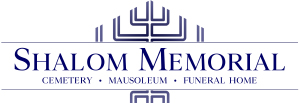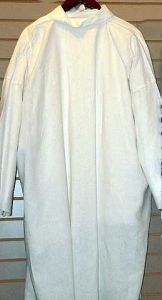Traditional Service Information
Shalom Memorial Park Cemetery and Funeral Home appreciates that what may be included in a each family’s funeral service may vary based the individual we are serving and the clergy presiding. The traditional funeral service is a powerful, time-tested ceremony which simultaneously cares for the departed loved one with respect and dignity while providing support and comfort for the mourners. This moment is particularly acute as the community of mourners transition from a life with their loved one’s physical presence into a life filled instead with the loved ones memory.
Traditionally, a Jewish funeral occurs as soon as possible following a passing. In the modern world, this frequently means that a service is held from one day to five days after a death. It is uncommon to have lengthy visitations prior to a funeral, rather the time to comfort mourners and to gather together begins immediately following the funeral service with the time of Shiva.
Shalom Memorial Funeral Home offers funeral services held in either the chapel on the grounds of the cemetery, entirely at the graveside, or held in a local synagogue. For those unable to be in physical attendance, services held in the Shalom Memorial chapel or at the graveside can be broadcast to family and friends around the world. The inclusion of the broadcast option is made at the discretion of the next of kin.
The traditional Jewish funeral service is typically a solemn event during which the Rabbi will lead those in attendance in a number of prayers and psalms. The prayers and psalms will typically include Psalm 23, the Kaddish, and the El Malei Rachamim. Eulogies may be offered but are certainly not required. In almost all cases, the casket will be present during the funeral service but will remain closed. Most clergy in our community will not allow an open casket to be present throughout the service.
At the graveside, all burial services held at Shalom Memorial Park cemetery will have a tent, chairs, and lectern in place at the graveside. This helps to facilitate the mourners’ burial prayers and their participation in the burial act. Each family will be offered the opportunity to participate in the act of helping to bury their loved one by placing a number of measures of earth into the gravesite. This act is seen as one of the greatest mitzvot because this is an act of kindness that can never be repaid by the recipient and is therefore done entirely as a selfless act of love.
Prior to the funeral service, a loved one is cared for by the Shalom Memorial Funeral Directors. For those families who choose, the Chevra Kaddisha can be called upon to perform a Tahara (ritual bathing) and a Shomer can be stay with the deceased from the time of passing until the time of burial.
Shalom Memorial Funeral Home offers a variety of traditional all-wood caskets to meet each families needs. Shalom Memorial Park Cemetery offers a variety of outer burial containers or burial vaults here again to meet the needs of each individual family. A bottomless version of the concrete outer burial container is available for those who wish that the casket is placed directly in-contact with the earth.
Immediately following a burial service, Shalom Memorial Park Cemetery will place a temporary name scroll at the graveside or crypt in order to mark the loved one’s resting place. When the weather permits, the area will be reconditioned and new sod will be installed. In the weeks that follow the burial service, the bronze memorial designers work with the next of kin to design and craft an appropriate and meaningful permanent bronze memorial.
Dedication Services can be held at any time following the installation of the permanent memorial. Dedication Kits which include prayers, kippot, and candles are available in the cemetery office.
Shiva Information
The word shiva literally means seven. In Judaism, the reference to shiva relates to the time of mourning immediately following the burial. Traditionally, during this period the immediate family will set-aside time to grieve and remember their loved one. The community of mourners may support the grieving loved ones by ensuring that their day-to-day needs are met. This may include bringing food to the shiva home and the gathering to form a minyan, if kaddish is to be said.
For detailing information about all aspects of Shiva, please refer to the Shalom Memorial Shiva.com partner pages.
Jewish Customs and Rituals
Judaism has certain time-honored traditions and rituals for funeral and burial practices. Some may be familiar and others less so. The following list is offered to those seeking to learn about any aspect or part of the Jewish funeral. Not all rites and rituals will be selected to be included by all families.


